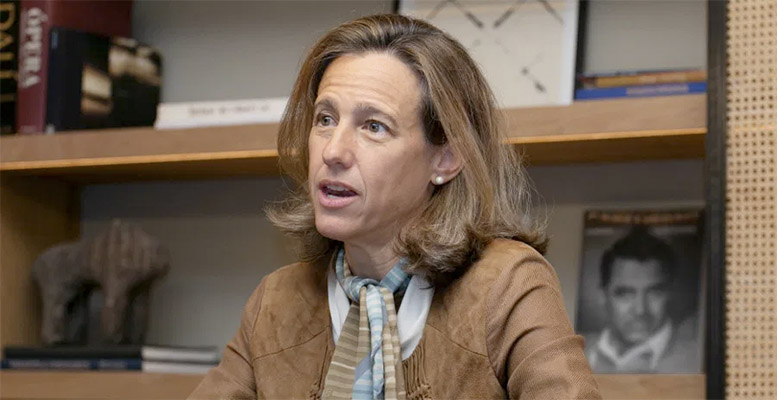Fernando Rodríguez | Nuria Aliño, advisor to the World Bank and director of Soltec, one of Spain’s listed solar energy companies, joined the global organisation in 2016 to drive the adoption of disruptive technologies in different industries and countries. She is currently a specialist in digital financial services at the IFC-World Bank, with a focus on digital transformation.
Q: You advise the World Bank, which focuses on poverty easing and underdeveloped countries. Why are open banking, digital banks, fintech, etc. so important for the World Bank?
A: Because the World Bank’s objective is to reduce poverty in the world and in order to channel its financial resources to countries, banking is essential. The World Bank supports the public sector and private companies. And in both, the financial industry is very relevant. The private sector is the responsibility of the IFC (International Finance Corporation), in which the financial industry represents 45-50% of its portfolio of 58,000 million dollars, as it is a fundamental channel for money to reach the most disadvantaged sectors. With respect to governments, the World Bank supports them in strengthening their financial systems to make them more efficient and competitive and thus expand access to financial services for underserved populations. When we talk about open banking, we have to distinguish between the support the World Bank gives to regulators and the support it gives to financial institutions…
Q: How?
A: For regulators, it helps them understand a global trend which encourages financial institutions to share – with authorised third parties – customer data or other financial services such as payment initiation, in a readable format – what is called Application Programming Interface (API) – with the customer’s consent. And it helps financial institutions to accelerate their strategy to integrate with partners through APIs to offer financial services in their ecosystem. Open banking favours collaboration between the different players you mentioned, resulting in an improved offer for the customer. Traditionally, financial services were provided by financial institutions, but this is no longer the case and there are new financial service providers with a very convenient offering for customers. For example, Ant Financial in China or Mercado Libre in Latin America, which started with payments, now offer a wide range of financial services to individuals and companies operating on their platforms. Credit is no longer originated exclusively by traditional banks. That is why the World Bank works with these ecosystems, where we talk about embedded finance, about contextual banking. In the context of an activity, the client pays or accesses a loan.
Q: So the World Bank’s interest in ‘open banking’ is based on increasing competition, access to the financial sector for excluded populations, innovation, transparency?
A: That’s right. The interest is to create awareness amongst regulators and financial institutions about the benefits it generates in relation to these pillars. In many countries, there are three or four institutions that have 80 or 85% market share, and they don’t always have a focus on financial inclusion. That is why open banking is important for the World Bank because it favours competition and financial inclusion.
Q: From your perspective, how do you see the Spanish fintech market?
A: The level of development of fintechs in a country depends mainly on the degree of development and deepening of banking, and the availability of resources from venture capital. For example, in China, as there is no retail banking, large platforms have been very successful because the user had no other option. In the United States and Asia there is a lot of availability of resources on the side of Venture capital interested in investing in fintechs that want to develop in markets where they have fewer competitors. In the case of Spain, in addition to the fact that traditional banking is very developed, venture capitalists prefer to invest in the European market, rather than only in the Spanish market. If you look, Spanish fintechs that internationalise do so more in Latin America than in Europe, where the barriers to entry are higher. You don’t see many Spanish fintechs with a strong positioning in Europe, while you do see British or European fintechs with continental expansion. Venture capital prefers a firm with expansion in Europe to a Spanish firm with a limited market.
The Spanish fintech market is developed, but is finding it harder to attract international funding to grow. However, in Spain I am surprised to see so few fintechs related to the open banking space. In other markets more players have been born that respond to the need to adapt to open banking, such as account aggregators, connectivity infrastructure providers or Banking as a Service providers. In fact, in one of the projects I am working on, it is a challenge to find BaaS providers to help migrants open an account and make international payments to their countries of origin.
Q: What do you think of the sandbox system for developing the fintech market in Spain?
A: It is an excellent idea to promote innovation. In fact, at the World Bank we promote sandboxes because it is a testing environment for regulators, central banks, supervisors… I will give you an example. With the Covid19 lock-ins, there have been many countries where in order to pay the $50 or $100 a month subsidies to many people living in absolute poverty, we have had to change the regulation and let people who couldn’t leave their homes open fully online accounts. Including remote identity validation. In many countries this possibility has been introduced, but there are others that have not yet done so and through the sandbox are testing before implementing a new regulation in this sense. The regulator tests, and when they feel comfortable and understand the implications, they change the regulation, which is a boost to their economy. Moreover, innovators do not want to encounter resistance from regulators, and sandboxes are also useful for avoiding that.





